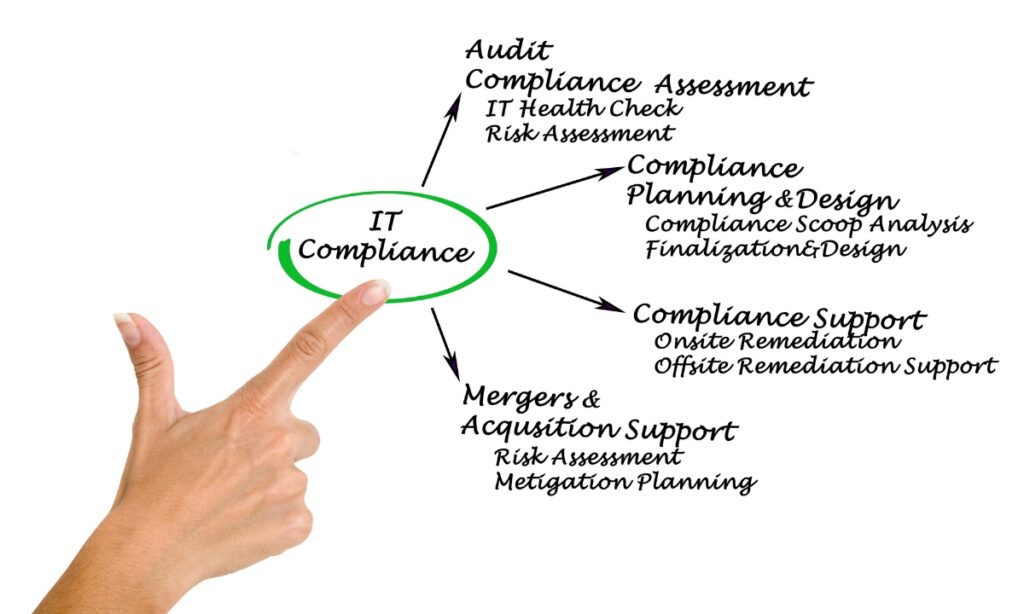IT Outsourcing services in San Francisco Bay Area involves providing important support for your company. If you’re one of the business owners in the Bay Area, read on to learn about how IT outsourcing services can make it easier to build a robust business.
What Are IT Outsourcing Services?
IT outsourcing services in San Francisco Bay Area are valuable ways for your business to have access to the best IT support without the need to invest in or set up an in-house team. While most IT services may vary based on providers, most services are based on IT support and cybersecurity.
Sometimes, a company’s internal IT department will work alongside the outsourced team to get the best result for the business. Such situations are often referred to as co-sourced support. While some businesses prefer just one IT outsourcing services in San Francisco Bay Area, others prefer outsourcing to multiple companies.

Managed IT Outsourcing Services in San Francisco Bay Area
Managed services are one of the most common types of IT outsourcing services in San Francisco. A managed service provider is a professional external IT firm that specializes in providing full network management for businesses in the San Francisco Bay Area. Learn about the types of IT managed services in San Francisco.
Let’s take a closer look at what many network management services in the bay area may include!

Setting Up and Managing Firewalls
Firewalls are vital components of network security, serving as a barrier between internal networks and the external world, safeguarding sensitive data and systems from unauthorized access and potential cyber threats. Here’s how an IT Outsourcing Managed IT Services provider in the Bay Area can assist with firewall setup and management, along with the benefits it brings:
Expertise and Experience: MSPs specialize in network security and possess extensive knowledge and experience in setting up and configuring firewalls. They stay updated with the latest security trends and best practices, ensuring the firewall is properly implemented to provide optimal protection for the organization.
Customized Firewall Configuration: San Francisco IT Outsourcing managed IT service providers assess a business’s specific needs and tailor the firewall configuration accordingly. They determine appropriate rule sets, access controls, and policies to align with the organization’s security objectives, industry compliance regulations, and operational workflows.
Proactive Monitoring and Maintenance: MSPs continuously monitor the firewall’s performance and activity, ensuring its effectiveness in detecting and mitigating potential threats. They promptly respond to security incidents and perform routine maintenance tasks such as applying patches and updates, optimizing firewall performance, and fine-tuning security policies.
Threat Intelligence and Response: Professional Bay Area IT Outsourcing managed IT services companies can access advanced threat intelligence tools and resources. They leverage this information to stay ahead of emerging threats, update firewall configurations, and implement proactive measures to prevent security breaches. In a security incident, they rapidly respond to contain and mitigate the impact, minimizing downtime and potential data loss.
Scalability and Flexibility: As businesses grow and their network infrastructure expands, MSPs can seamlessly scale up the firewall solution to accommodate evolving needs. They can add security features, implement virtual private networks (VPNs), or integrate the firewall with other security solutions for comprehensive protection.

Providing Disaster Recovery Support
Disasters pose significant risks to businesses, leading to data loss, downtime, and financial losses. An IT Outsourcing MSP provides crucial support in disaster recovery:
- They develop tailored disaster recovery plans, assessing vulnerabilities and outlining steps for swift restoration.
- Implementing robust backup solutions ensures data integrity and availability, minimizing downtime.
- Setting up system replication and failover mechanisms ensures continuous availability of critical systems.
- Collaborating on Rapid Recovery Time Objectives (RTOs) minimizes downtime during disasters.
- Regular testing and validation of disaster recovery plans ensure reliability and readiness, enhancing overall resilience.

Setting Up Virtual Private Networks
VPNs establish secure connections between remote users or branch offices and the organization’s network, enabling secure access to resources and protecting sensitive data. Here’s how an MSP can assist with setting up VPNs and the benefits it brings:
- Expertise in VPN Technology: MSPs specialize in network security and possess extensive knowledge and experience in VPN technology. They know various VPN protocols, encryption algorithms, and authentication mechanisms. Leveraging their expertise, MSPs can design and implement VPN solutions that align with the organization’s security requirements and operational needs.
- Customized VPN Configuration: MSPs assess the organization’s remote access requirements and design a VPN configuration tailored to its specific needs. They determine the appropriate VPN protocol, encryption strength, and access control policies. By customizing the VPN setup, MSPs ensure optimal security while maintaining usability and performance.
- Remote User and Branch Office Connectivity: MSPs facilitate secure connectivity for remote users and branch offices, regardless of location. They configure VPN clients on laptops, smartphones, or tablets, enabling remote workers to access the organization’s network resources securely. MSPs also establish site-to-site VPN connections, seamlessly connecting branch offices to the main network.
- Enhanced Security and Data Protection: VPNs provide a secure tunnel for data transmission, encrypting the traffic between the user’s device and the organization’s network. This encryption protects sensitive data from interception and unauthorized access, even when transmitted over untrusted networks like public Wi-Fi. MSPs ensure the VPN solution implements robust encryption algorithms and secure authentication methods, bolstering the organization’s overall security posture.
- Monitoring and Support: MSPs provide ongoing monitoring and support for the VPN infrastructure. They track VPN connections, monitor performance, and identify potential issues or security vulnerabilities. MSPs also offer timely support and troubleshooting to address connectivity or configuration problems, ensuring uninterrupted access for remote users and branch offices.

Monitoring Activities Across The Network
Network monitoring involves continuously surveilling network devices, systems, and traffic to detect anomalies, ensure optimal performance, and proactively identify and address security threats. Here’s how an MSP can assist with network monitoring and the benefits it brings:
- Proactive Threat Detection: MSPs employ advanced monitoring tools and technologies to continuously scan network traffic, system logs, and security events for potential threats. They analyze patterns, detect anomalies, and promptly respond to security incidents. By identifying and addressing threats in real time, MSPs minimize the risk of data breaches, system compromises, and unauthorized access.
- Performance Optimization: MSPs monitor network performance metrics, such as bandwidth utilization, response times, and network latency. They identify bottlenecks, network congestion, or other issues that could impact performance. With this information, MSPs can optimize network configurations, fine-tune resource allocation, and ensure optimal network performance, improving productivity and user experience.
- Proactive Maintenance and Upgrades: By monitoring network devices and infrastructure, MSPs can track their health, performance, and capacity. They identify devices requiring maintenance or upgrades, ensuring they operate at their best capacity. This proactive approach helps prevent downtime, performance degradation, and potential failures, increasing network reliability and availability.
- Compliance and Auditing: MSPs assist businesses in meeting regulatory compliance requirements by monitoring and reporting on network activities. They track and document user access, network changes, and data transmissions to ensure compliance with industry standards and regulations. MSPs provide businesses with comprehensive reports and audits, simplifying compliance efforts and reducing the risk of non-compliance penalties.
- Alerting and Incident Response: MSPs configure monitoring systems to generate real-time alerts for critical events, security breaches, or performance degradation. They establish incident response protocols, enabling rapid response to mitigate risks and minimize downtime. MSPs also investigate and provide detailed incident reports, allowing businesses to understand the root cause of issues and implement preventive measures.

Installing Various Communication Software Including VoIP
Voice over Internet Protocol (VoIP) systems revolutionize business communication by enabling voice and multimedia exchanges over the Internet, offering flexible and cost-effective solutions. Here’s how an MSP facilitates VoIP installation and its advantages:
- Expertise in Communication Technologies: MSPs possess specialized knowledge in communication technologies, including VoIP systems. They stay abreast of industry trends, ensuring businesses receive suitable and efficient communication software.
- Assessment and Customization: MSPs evaluate the organization’s communication requirements, infrastructure, and goals to tailor VoIP installation. This customization aligns with specific needs, ensuring optimal performance and functionality.
- Efficient Deployment and Configuration: MSPs handle deploying and configuring communication software, including VoIP systems. They seamlessly integrate hardware, software, and network infrastructure while configuring features to meet business requirements.
- Training and Support: MSPs provide comprehensive training to users on effectively utilizing communication software. They offer ongoing technical support, troubleshooting, and maintenance to minimize disruptions and maximize productivity.
- Cost Savings and Scalability: VoIP systems deliver significant cost savings compared to traditional phone systems. MSPs help businesses capitalize on these advantages by implementing VoIP solutions that streamline communication and ensure scalability to accommodate evolving needs.
How Bay Area Managed IT Service Providers Can Help
One of the core benefits of Bay Area managed IT services is taking the stress out of maintaining your business IT infrastructure. Let’s take a little bit of a closer look at how these IT Management Services companies can help local San Francisco businesses!

Round-the-Clock Monitoring
Round-the-clock monitoring (24/7/365) is crucial for ensuring the smooth functioning of network devices, servers, applications, and security systems. Here’s how an IT Outsourcing MSP aids in this process:
- Proactive Issue Detection: IT Outsourcing MSPs employ advanced monitoring tools to track real-time performance indicators, system logs, and security events. By analyzing data patterns, they can identify potential issues such as hardware failures or security breaches before they escalate.
- Early Problem Resolution: With continuous monitoring, IT Outsourcing MSPs swiftly identify and diagnose issues as they arise, receiving real-time alerts for critical events. Their expertise enables them to troubleshoot and resolve problems promptly, minimizing downtime and reducing business impact.
- Improved System Reliability: By monitoring network devices, servers, and applications, IT Outsourcing MSPs ensure optimal performance. They address performance bottlenecks and conduct regular maintenance to maintain system stability and reliability.
- Enhanced Security: Through real-time security event monitoring, IT Outsourcing MSPs detect and mitigate potential security threats such as malware infections or unauthorized access attempts, bolstering the organization’s security posture and safeguarding sensitive data.
- Peace of Mind and Business Continuity: The constant monitoring provided by IT Outsourcing MSPs offers peace of mind to businesses, reducing the risk of unexpected downtime and associated financial losses. Their proactive approach contributes to business continuity, ensuring critical systems remain operational and available.

Increased Expertise
Round-the-clock monitoring (24/7/365) is vital for the seamless operation of network devices, servers, applications, and security systems. Here’s how an IT Outsourcing MSP supports this effort:
- Proactive Issue Detection: Utilizing advanced monitoring tools, IT Outsourcing MSPs track real-time performance indicators and security events. By analyzing data patterns, they identify potential issues like hardware failures or security breaches before they escalate.
- Early Problem Resolution: With continuous monitoring, IT Outsourcing MSPs swiftly identify and diagnose issues, receiving real-time alerts for critical events. Their expertise allows them to troubleshoot and resolve problems promptly, minimizing downtime and business impact.
- Improved System Reliability: IT Outsourcing MSPs ensure optimal performance by monitoring network devices, servers, and applications. They address performance bottlenecks and conduct regular maintenance to uphold system stability and reliability.
- Enhanced Security: Through real-time security event monitoring, IT Outsourcing MSPs detect and mitigate potential security threats, bolstering the organization’s security posture and protecting sensitive data.
- Peace of Mind and Business Continuity: Constant monitoring by IT Outsourcing MSPs provides peace of mind to businesses, reducing the risk of unexpected downtime and financial losses. Their proactive approach supports business continuity, ensuring critical systems remain operational and available.

Scalable Services
Scalable services refer to the ability to expand or contract IT capabilities based on evolving demands easily. Here’s how an MSP can assist with scalable services and the benefits it brings:
- Flexible Resource Allocation: MSPs offer flexible resource allocation to meet changing business needs. They can quickly allocate or reallocate IT resources like hardware, software, storage, and bandwidth, ensuring optimal resource utilization and cost-effectiveness.
- On-Demand Support and Services: MSPs provide on-demand support and services, including technical support, help desk services, and infrastructure management. They can scale services up or down as needed, offering timely and efficient support.
- Rapid Deployment of New Technologies: MSPs stay updated with the latest technologies, enabling businesses to adopt new IT solutions seamlessly. Whether it’s cloud computing, virtualization, or advanced security measures, MSPs facilitate smooth integration.
- Cost Optimization: Scalable services contribute to cost optimization by allowing businesses to pay only for the resources they need. MSPs offer cost-effective solutions and leverage their expertise to provide services at a fraction of the cost of in-house infrastructure.
- Agility and Business Continuity: Scalable services make businesses more agile and responsive to market changes. MSPs help organizations adapt their IT infrastructure to support growth and ensure business continuity with redundancy and failover mechanisms.

Reduce In-House Hires
Scalable services refer to the capability to adjust IT capabilities according to evolving demands. Here’s how an MSP aids in this aspect and its benefits:
- Flexible Resource Allocation: MSPs offer adaptable resource allocation to meet dynamic business needs. They efficiently allocate or reallocate IT resources like hardware, software, storage, and bandwidth, ensuring optimal utilization and cost-effectiveness.
- On-Demand Support and Services: MSPs deliver on-demand support and services, covering technical support, help desk services, and infrastructure management. They scale services as required, providing prompt and effective support.
- Rapid Deployment of New Technologies: With up-to-date knowledge, MSPs facilitate seamless adoption of the latest technologies. Whether it’s cloud computing, virtualization, or advanced security measures, MSPs ensure smooth integration.
- Cost Optimization: Scalable services lead to cost optimization by aligning expenses with actual resource needs. MSPs offer economical solutions, leveraging expertise to deliver services at a fraction of in-house infrastructure costs.
- Agility and Business Continuity: Scalable services enhance business agility and continuity. MSPs assist organizations in adapting IT infrastructure to support growth and ensure continuous operations through redundancy and failover mechanisms.

Reduce IT Costs
Organizations can benefit from cost savings by outsourcing certain IT functions to an MSP. Here’s how an MSP can help reduce IT costs and the benefits it brings:
- Predictable and Controlled Expenses: MSPs typically offer their services at a fixed monthly or annual cost, allowing businesses to have predictable and controlled IT expenses. This eliminates the need for large upfront investments in infrastructure, software licenses, and staffing. With an MSP, businesses can budget more effectively and allocate their resources strategically.
- Eliminating Hiring and Training Costs: Building and maintaining an in-house IT team can be expensive. By partnering with an MSP, businesses can reduce or eliminate these costs. MSPs have skilled professionals ready to handle IT tasks, eliminating the need for extensive hiring efforts and ongoing training.
- Scalable IT Services: MSPs offer scalable IT services that can be tailored to the specific needs of a business. As organizations grow or experience fluctuations in demand, MSPs can easily scale their services up or down. This ensures that businesses only pay for the IT services they require, avoiding unnecessary costs associated with maintaining an in-house team during periods of low demand.
- Access to Specialized Expertise: MSPs have a wide range of specialized expertise in different IT domains. By partnering with an MSP, businesses gain access to this expertise without hiring individual specialists for each area. This reduces the costs of recruiting and maintaining a team of highly skilled IT professionals in-house.
- Enhanced Efficiency and Productivity: MSPs improve IT efficiency and productivity, leading to cost savings. They leverage their experience, knowledge, and resources to streamline IT operations, optimize processes, and implement best practices. This results in increased productivity reduced downtime, and improved overall IT performance, all contributing to cost savings in the long run.

Help To Strengthen Your IT Backbone
Whether you know it or not, your IT department is your business’s backbone. It keeps your systems running smoothly and your data secure. This gives your business the ability to continue to grow.The solution? Consider partnering with a Managed Service Provider (MSP) in the Bay Area. These providers can supplement your IT department’s capabilities, improving your business’s scalability, flexibility, and security by adding a lot of additional costs associated with hiring additional employees.
Unburden Your In-House IT Staff
Many in-house IT teams struggle to keep up with backlogged issues, from network troubleshooting to updating software and systems, leaving little room for innovation or strategic planning. They check in, do as many tasks as possible on the backlog list throughout the day, and then go home. That’s not conducive to protecting and scaling your business. By partnering with a Bay Area MSP, your IT staff can delegate routine tasks, giving them more time to focus on strategic initiatives that can help push your business forward.

How To Choose the Right IT Support
Check online reviews to assess reputation, and select a reputable company aligned with your goals. For more information or to get started, contact us at 911 PC Help. We’re here to assist!

